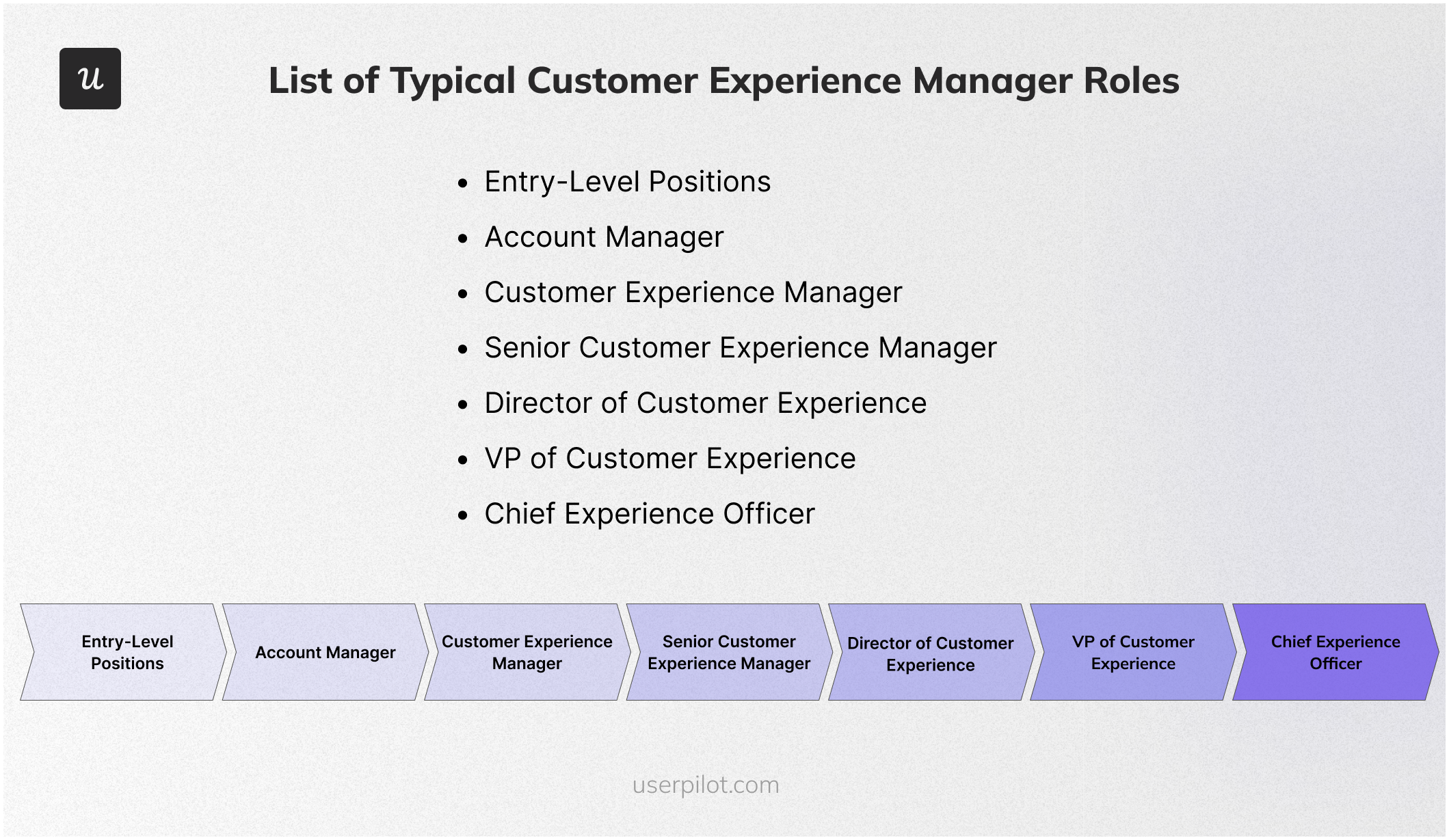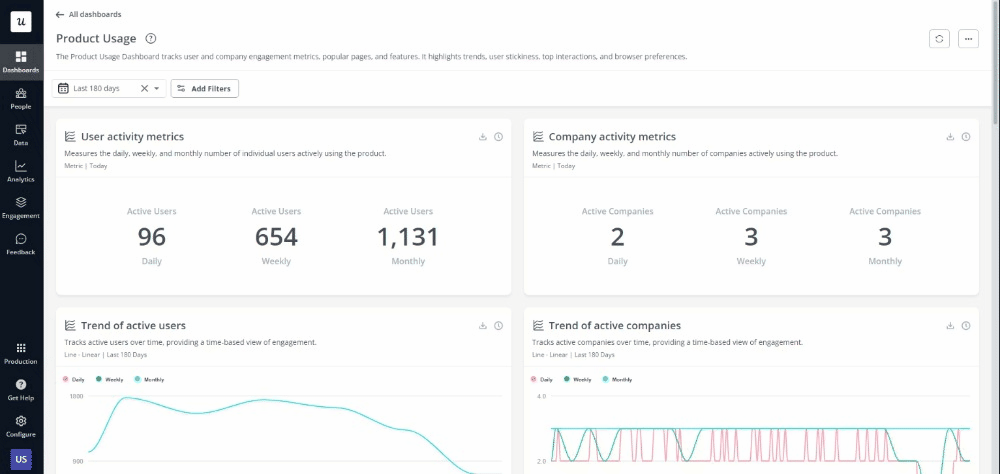![How to Become a Customer Experience Manager [+Tools and Resources]](https://blog-static.userpilot.com/blog/wp-content/uploads/2024/07/How-to-Become-a-Customer-Experience-Manager-tools-and-resources-450x295.png)
Try Userpilot Now
See Why 1,000+ Teams Choose Userpilot

Customer experience manager’s main responsibilities
Key responsibilities of a CX manager include:
- Customer journey mapping – A CX manager identifies all the touchpoints a customer goes through, from their first contact to post-purchase, and pinpoints the challenges customers face at each touchpoint.
- Customer satisfaction and loyalty – A CX manager is responsible for identifying ways to eliminate friction from the user journey, improve satisfaction levels, and build a community of loyal brand advocates.
- Recruitment and training – They are often tasked with hiring professionals for customer-facing teams. Also, they equip these professionals with adequate training to ensure positive interactions with the brand at each touchpoint.
- Cross-functional collaboration and leadership – CX managers work in a cross-functional environment where they lead a team of professionals from different departments. These include marketing, product, sales, and customer service.
- Customer feedback management – A CX manager is responsible for collecting and analyzing user feedback and using those insights to suggest necessary CX enhancements.
- CX strategy development – A CX manager digs deeper into user needs and pain points and devises ways to eliminate friction from their journey. The idea is to deliver an outstanding experience that lives up to user expectations.
Customer experience manager career path
A CX manager’s career usually starts with an entry-level role like a customer service representative or sales associate. You can also transition into a CX manager’s role from other positions, such as marketing manager and customer insights analyst.
Here’s what the typical career path of a CX manager looks like:
- Entry-level positions (0-2 years): Roles like customer service representative, CX associate, and sales executive offer a gateway to a career in customer experience.
- Account Manager (2-4 years): An account manager is in charge of specific customer accounts and focuses on improving their retention and lifetime value.
- Customer Experience Manager (4-6 years): After gaining adequate experience in customer-facing positions, you can step into the role of a CX manager.
- Senior Customer Experience Manager (6-8 years): This role involves leading a team of CX professionals to execute various customer experience programs. Also, you’re responsible for collaborating with cross-functional teams.
- Director of Customer Experience (8-10 years): As the Director of CX, you’re in charge of a company’s entire customer experience function.
- VP of Customer Experience (10-15 years): In this senior-level role, you’re responsible for fostering a customer-centric culture across the organization and shaping various CX programs.
- Chief Experience Officer (CXO) (15+ years): This C-suite role is the highest position in a CX management career.
How to become a customer experience manager?
A good starting step is to pursue a bachelor’s in business administration, marketing, psychology, or any other related field that familiarizes you with consumer insights and industry trends. Additionally, consider gaining professional experience in entry-level customer-facing roles like a sales associate or customer support executive.
It’s also a good idea to get relevant certifications such as the Certified Customer Experience Professional (CCXP) to build credibility. While you’re at it, make sure you stay abreast of the latest tech innovations and trends in CX and changes in customer mindsets.
What skills should a customer experience manager have?
Being a CX manager means leaving no stone unturned to delight users with positive interactions across different touchpoints. That, in turn, makes the following skills non-negotiable:
- Empathy – A good CX manager is adept at stepping into a customer’s shoes and developing a deep understanding of their ambitions, goals, needs, and pain points.
- Communication – Strong verbal and nonverbal communication skills are a must, given that CX managers have to interact with customers, team members, and senior leadership. They must be able to convey their ideas and feedback in an easily understandable way.
- Problem-solving – CX managers should be well-versed in identifying potential product issues and devising suitable solutions. When interacting with customers, they must be able to provide the right solutions to a problem while maintaining their calm.
- Leadership – They should be able to guide a cross-functional team, set their goals and expectations, and inspire them to embrace a customer-first mindset.
- Product knowledge – A CX manager must be well-versed in the ins and outs of a product and how it helps different users realize their goals. Also, they should have a clear idea of potential shortcomings and areas of friction.
- Data management and analytics – CX managers should be open to working with various types of data, from customer behavior and feedback to product growth metrics. They must possess the technical know-how to extract meaningful insights from the data and make evidence-based decisions.
- Agility and flexibility – The best CX managers constantly adapt their approach to changes in user behavior and preferences and industry dynamics.
Best certifications for customer experience managers
Obtaining the right certifications can significantly boost your expertise and career prospects. Acknowledging that, here are some of the top certifications for CX professionals:
- Certified Customer Experience Professional (CCXP) (Customer Experience Professionals Association (CXPA)): This certification is a well-regarded option for CX professionals. CXPA is a recognized organization in the field, and the CCXP validates your understanding of core CX principles, including customer journey mapping, experience design, and measurement.
- Professional in Customer Experience (PCX) Certification (Customer Experience Professionals Association (CXPA)): This broader CXPA certification focuses on the entire customer experience journey. It can enhance your understanding of customer needs and expectations across all touchpoints.
Business Certifications (Valuable for CX Managers):
- Project Management Professional (PMP) Certification (Project Management Institute (PMI)): Many CX initiatives involve project management. This certification equips you with methodologies for managing projects like customer journey improvements or implementing new CX technologies, a skill valued by employers.
- Certified Business Analysis Professional (CBAP) Certification (International Institute of Business Analysis (IIBA)): CX managers often analyze customer data and feedback to identify areas for improvement.
Marketing & Analytics Certifications (Valuable for CX Managers):
- Professional Certified Marketing Manager (PCMM) Certification (American Marketing Association (AMA)): Understanding marketing concepts is valuable for CX managers. This certification strengthens your knowledge of marketing strategies and their alignment with customer experience goals.
- Google Data Analytics Professional Certificate (Google on Coursera): Earning this practical certification equips you with skills in data collection, analysis, and visualization using Google tools. Customer experience decisions are often data-driven, and having this certification can enhance your ability to make informed decisions.
Best resources for customer experience managers
If you’re looking to build a successful career in CX management, the following resources will come in handy:
Best books for customer experience managers
Dive into these insightful reads to gain a deeper understanding of CX principles, strategies, and psychology:
- The Ten Principles Behind Great Customer Experiences by Matt Watkinson – Dig deeper into the core principles of CX with real-life examples.
- The Cult of the Customer by Shep Hyken – Discover strategies to delight customers and turn them into loyal brand advocates.
- More Is More by Blake Morgan – Understand the importance of going the extra mile to design excellent customer experiences.
- The Effortless Experience by Matthew Dixon, Nick Toman, and Rick DeLisi – Discover a four-step framework to win customers with a frictionless experience.
- The Power of Moments by Chip Heath and Dan Heath – Find out what goes into creating memorable moments that make customers stick.
You’ll find these books on Amazon and eBay.
Best webinars for customer experience managers
Expand your knowledge and stay up-to-date with the latest CX trends and insights through these informative webinars:
- Userpilot – Find live and on-demand webinars on customer experience and product analytics, particularly in the context of SaaS.
- BrightTALK.com – Discover a vast collection of fireside chats, talks, and webinars by industry experts.
- Gartner – Learn about the impact of new tech like generative AI on customer experience.
- Cisco – Explore a selection of webinars featuring insights into the latest CX trends from industry experts.
- Qualtrics – Watch on-demand webinars on topics like using AI for customer experience and measuring the impact of CX.
Best blogs for customer experience managers
Stay informed and get your daily dose of CX inspiration with these insightful blogs:
- Userpilot’s blog touches upon several CX-related topics, from user behavior analytics and feedback to onboarding.
- Shep Hyken’s Customer Service Blog spills the beans on different aspects of CX, including customer loyalty, relationship management, and more.
- CustomerThink brings you insights on CX strategies, technology, and more from a global community of experts.
- Customer Bliss brings Jeanne Bliss’s expertise to help you win new customers at scale.
- HubSpot’s Service Blog covers a broad spectrum of CX-related topics, with a special focus on customer success.
Best podcasts for customer experience managers
Tune in to these engaging podcasts to hear from CX experts, learn about new strategies, and get inspired:
- Crack the Customer Code by Jeannie Walters and Adam Toporek – Understand the ins and outs of designing unforgettable customer experiences with insights from different industry professionals; available on Apple and Spotify.
- The CX Leader Podcast by Steve Walker – Discover tactics to build the necessary skills and advance your career in CX leadership; available on Apple and Spotify.
- CX Today – Stay on top of the latest trends and best practices shaping the CX landscape; available on Apple and Spotify.
- Experience This! by Joey Coleman and Dan Gingiss – This lively show covers a broad spectrum of CX-related topics, from fundamentals to future trends; available on Apple and Spotify.
- The Intuitive Customer by Colin Shaw and Prof. Ryan Hamilton – A show that covers the most complex CX topics with a casual and fun vibe; available on Apple and Spotify.
Best tools for customer experience managers
Being a CX manager means juggling multiple responsibilities, from mapping user journeys to monitoring the impact of customer experience strategies. Plus, you have to stay on top of market trends and changing user preferences. You’re even responsible for training and guiding customer-facing teams to improve user interactions at various touchpoints.
While the job comes with several complexities, using the right tools can make it easier. Here are a few tools that come in handy for customer experience managers:
- Best tool for in-app CX: Userpilot – Userpilot offers numerous features to help you improve the in-app experience of your users. From tooltips to resource centers and surveys, it lets you understand your customers and create self-help resources for them.
- Best tool for project management: Monday – The feature-packed project management platform lets you choose from 27+ views, including Gantt charts and Kanban boards. It’s ideal for CX managers leading hybrid cross-functional teams to develop and execute various CX strategies.
- Best tool for product management: Jira – With Jira, you can collaborate with product teams and stay on top of product development and enhancement projects. You can even use the platform’s AI capabilities to generate actionable insights from your ideas.
- Best tool for CX: Freshdesk – The cloud-based software by Freshworks comes with an AI-powered ticketing system and helpdesk solution. It’s ideal for delighting users with prompt, personalized support.
- Best tool for customer success: ClientSuccess – The intuitive platform comes with several useful features, such as customer portals and user journey mapping. Plus, you can access a ton of valuable insights into user retention and churn.
- Best tool for data analytics: Tableau – The business intelligence software helps CX managers analyze user behavior data, retrieve actionable insights, and generate visual reports.
Customer experience manager FAQs
- What are the skills of a customer experience manager?
Essential skills for a customer experience manager include agility, empathy, customer advocacy, communication, and problem-solving. CX managers should also possess excellent data management, analytical, and leadership skills. Technical fluency in CRM platforms and customer feedback tools is crucial, too.
- How to become a CX manager?
A good starting step is to pursue a bachelor’s degree in business administration, marketing, psychology, or a related field. Also, try to gain relevant experience in entry-level sales or customer support roles that let you dig deeper into customer insights and journeys. You can even pursue a master’s degree in a relevant field or get CX-related certifications to advance your career.
- What is a CX job description?
A CX manager’s job description lists must-have skills, such as empathy, customer advocacy, leadership, and communication. Additionally, it outlines the main responsibilities of the role, which include addressing customer complaints, collecting and analyzing feedback, and leading cross-functional teams.
- Is customer experience manager a good job?
Customer experience professionals are in high demand across various industries, from retail and healthcare to tech. As a customer experience manager, you get opportunities to impact a company’s brand image and reputation positively and enhance customer loyalty. Also, the role offers competitive salaries and plenty of opportunities for career development.
Conclusion
Becoming a successful customer experience manager requires dedication, continuous learning, and a proactive approach to developing relevant skills.
By following the outlined steps and leveraging the resources available, you can effectively navigate your career path and achieve your professional goals.
We hope this guide has provided you with valuable insights and practical advice to help you on your journey to becoming a proficient and impactful customer experience manager!
Looking into tools for customer experience managers? Userpilot is an all-in-one product platform with engagement features and powerful analytics capabilities. Book a demo to see it in action!









